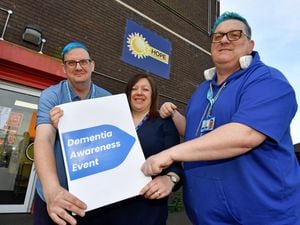Talk with long-lost brother leads to genetic heart condition diagnosis for mum and daughter
A mother from Stafford has praised a genetic testing service after it revealed she and her eight-year-old daughter have a potentially life-threatening heart condition.

Katie Cox and her eight-year-old twins were offered genetic testing after a conversation with her long-lost brother raised the possibility of a family health issue.
Katie and her twins Anthony and Amber were all tested at Stafford's County Hospital – with the mother and daughter being diagnosed with "Long QT Syndrome".
The condition can lead to an abnormal heart rhythm and cardiac arrest, but can be detected through the testing from the University Hospitals of North Midlands NHS Trust (UHNM).
The new service allows testing for inherited cardiac conditions (ICCs), which are a group of potentially fatal disorder which affect the heart muscle, heart rhythm and aorta and can be passed on in families.
Katie's eight-year-old son tested negative but his sister Amber – who already has a defective heart valve – received the Long QT Syndrome diagnosis with her mother.
Katie said: “We knew there was a 50/50 chance the heart condition would be passed on and while it’s not good that Amber has it, it’s great that she can receive treatment. There are even things that can be done to ensure the defect isn’t passed on to her children in the future.
"We talked about the fact that Jason [Katie's brother] had the syndrome, but I didn’t really think about it too much. There were so many other things to talk about! I did have palpitations sometimes, but I always put these down to stress.
"For about a year after we met I carried on as normal, but then the palpitations started to get worse and I began to experience a bit of dizziness. I went to my GP and was referred to the hospital, where I was offered genetic testing. I decided to go ahead with it and I’m so glad I did. I’m now on medication which helps to alleviate the symptoms."
Katie and her family have been busy raising funds for a defibrillator which has now been installed at Amber’s school, Silkmore Primary Academy in Stafford, with the help of charity AED Donate.
She added: "Some people might be hesitant to go ahead with the testing because they’re worried about the impact it will have on their life, but I did it for my children and knowing what we were dealing with put my mind at rest too.
"I try to teach my children to look at the positive side of things, and an example of this is that if we weren’t now in this situation ourselves, we wouldn’t have had the experience of doing the fundraising work. That defibrillator will be of benefit to people in the community for many years to come. You have to think of how future generations will benefit."
Before the service was set up at County Hospital and the Royal Stoke University Hospital, families would have to travel to the Manchester Centre for Genomic Medicine or the Birmingham Women and Children's NHS Foundation Trust's clinical genetics unit for testing.
The ICC team at UHNM provide diagnosis, family screening, specialised care and support to patients and their families who are affected by ICCs and Sudden Arrhythmic Death Syndrome (SADS). The team includes dedicated consultant cardiologists and a specialist nurse working in collaboration with the genetics team in Birmingham.
Dr Rhys Beynon, consultant cardiologist at the health trust, said: "We strongly feel this new service will increase the quality of care our patients receive. However, the clinic isn’t just about caring for the patient, it’s also about looking after other family members who may be unaware of their risks."
Specialist nurse Katy Stern provides counselling, gathers consent and arranges blood samples which are then sent for analysis to Birmingham Women and Children’s NHS Foundation Trust’s clinical genetics unit and Oxford Medical Genetics Laboratories.
Katy travelled to Manchester on a weekly basis for 18 months to train with the genetics team in preparation for the launch of the new clinic. She said: "This is a really exciting development for UHNM and pivotal to the care of families affected by ICCs. We have worked really hard to set up these dedicated clinics and a large multidisciplinary team is involved to ensure patients and their families are offered the highest quality of specialised care. We keep families’ needs at the heart of everything we do."
Patients are referred to the service through their GP and receive an assessment similar to other outpatient clinic appointments – with patients, who received a diagnosis, receiving help to understand the results and implications for the rest of the family. If a faulty gene is identified, the wider family may be offered testing.
The ICC team explores family history to see if there are any obvious conditions already present in close family members, and families are offered screening, support and help to learn more about the condition.





